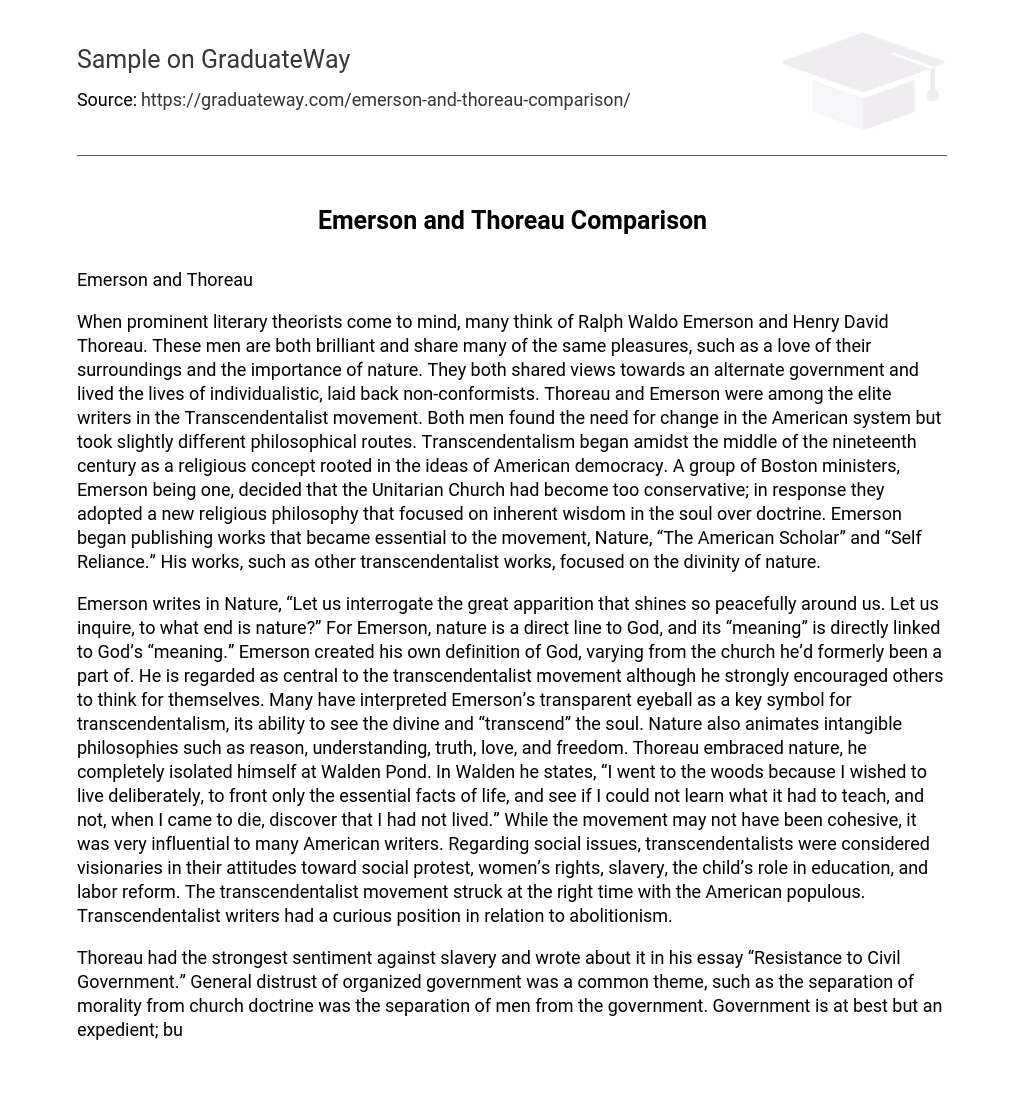Emerson and Thoreau
When prominent literary theorists come to mind, many think of Ralph Waldo Emerson and Henry David Thoreau. These men are both brilliant and share many of the same pleasures, such as a love of their surroundings and the importance of nature. They both shared views towards an alternate government and lived the lives of individualistic, laid back non-conformists. Thoreau and Emerson were among the elite writers in the Transcendentalist movement. Both men found the need for change in the American system but took slightly different philosophical routes. Transcendentalism began amidst the middle of the nineteenth century as a religious concept rooted in the ideas of American democracy. A group of Boston ministers, Emerson being one, decided that the Unitarian Church had become too conservative; in response they adopted a new religious philosophy that focused on inherent wisdom in the soul over doctrine. Emerson began publishing works that became essential to the movement, Nature, “The American Scholar” and “Self Reliance.” His works, such as other transcendentalist works, focused on the divinity of nature.
Emerson writes in Nature, “Let us interrogate the great apparition that shines so peacefully around us. Let us inquire, to what end is nature?” For Emerson, nature is a direct line to God, and its “meaning” is directly linked to God’s “meaning.” Emerson created his own definition of God, varying from the church he’d formerly been a part of. He is regarded as central to the transcendentalist movement although he strongly encouraged others to think for themselves. Many have interpreted Emerson’s transparent eyeball as a key symbol for transcendentalism, its ability to see the divine and “transcend” the soul. Nature also animates intangible philosophies such as reason, understanding, truth, love, and freedom. Thoreau embraced nature, he completely isolated himself at Walden Pond. In Walden he states, “I went to the woods because I wished to live deliberately, to front only the essential facts of life, and see if I could not learn what it had to teach, and not, when I came to die, discover that I had not lived.” While the movement may not have been cohesive, it was very influential to many American writers. Regarding social issues, transcendentalists were considered visionaries in their attitudes toward social protest, women’s rights, slavery, the child’s role in education, and labor reform. The transcendentalist movement struck at the right time with the American populous. Transcendentalist writers had a curious position in relation to abolitionism.
Thoreau had the strongest sentiment against slavery and wrote about it in his essay “Resistance to Civil Government.” General distrust of organized government was a common theme, such as the separation of morality from church doctrine was the separation of men from the government. Government is at best but an expedient; but most governments are usually, and all governments are sometimes, inexpedient. The objections which have been brought against a standing army, and they are many and weighty, and deserve to prevail, may also at last be brought against a standing government. The standing army is only an arm of the standing government. The government itself, which is only the mode which the people have chosen to execute their will, is equally liable to be abused and perverted before the people can act through it. Thoreau, “Civil Disobedience”
The American government was losing face with its People. Thoreau claimed it was not living up to the expectation that the great American government should. Thoreau argues that government rarely proves itself useful and it derives its power from the majority because they are the strongest group not necessarily the best, most legitimate group. Emerson focused on the idea of self-government and a smaller established government. “The less government we have, the better, – the fewer laws, and the less confided power.” But he also points out that political institutions are built by the people, which is where self-governing comes into play. Thoreau, on the other hand, doubts the effectiveness of government reform and argues that petitioning for change does little to nothing.
Social and political reform comes both from the masses and the individual. If the individual does not see or understand the importance in change, they will not join a cause or a group that supports change and the state would lay stagnant. “Transcendentalism can be summed up as the individual’s quest for an “original relation to the universe.” This is much of what drove Emerson from the pulpit into his study to become a writer and thinker. It is why Henry David Thoreau went to Walden Pond.” (Felton 5) Brian Walker, writer for the Encyclopedia of Political Theory, surmises “Thoreau believed that only moral suasion and the ethical cultivation of the hearts and minds of the population will bring about lasting change in the nation because political mobilization without ethical cultivation simply empowers and gives voice to an unprincipled population. –Thoreau thus calls on the moral heroism of individual citizens as a spur to change public opinion and government policy.”
Emerson and Thoreau are both great men with fantastic ideas on American culture, development, and reform. They share a multitude of ideals but vary, distinctly on how to achieve their goals. Through the transcendentalist literary movement they help shape the Antebellum political movement and successfully define and illustrate American literature.
Works Cited
Bevir, Mark. Encyclopedia Of Political Theory. London: SAGE, 2010. eBook Collection (EBSCOhost).
Buell, Lawrence. Emerson. Cambridge, Mass: Belknap Press of Harvard University Press, 2003. eBook Collection (EBSCOhost).
Felton, R. Todd. A Journey Into The Transcendentalists’ New England. Berkeley, Calif: Roaring Forties Press, 2006. eBook Collection (EBSCOhost). Web. 28 Oct. 2013.
Mariotti, Shannon L. Thoreau’s Democratic Withdrawal : Alienation, Participation, And Modernity. Madison, Wis: University of Wisconsin Press, 2010. eBook Collection (EBSCOhost).
Petrulionis, Sandra Harbert. Thoreau In His Own Time : A Biographical Chronicle Of His Life, Drawn From Recollections, Interviews, And Memoirs By Family, Friends, And Associates. Iowa City: University of Iowa Press, 2012. eBook Collection (EBSCOhost).





